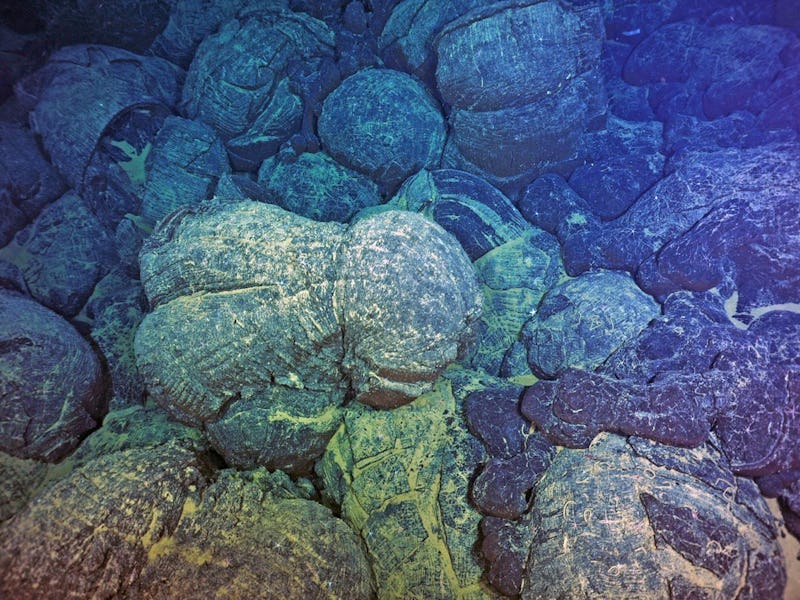Volcanic Rock Discovery Calls Theories About Life's Origins Into Question
Animals may have emerged under very different conditions.

Charles Darwin, father of evolutionary biology, wrote in 1871 that life first emerged in “warm little ponds”, which he imagined to be small wells of water and chemicals, heated by the sun and surrounded by rocks and air. With these few ingredients and a big dose of randomness, he posited, the basic elements of life clicked together, leading to simple life forms, like bacteria. Their evolution over millions of years eventually led to the sophisticated life forms that now inhabit the planet.
These days, scientists generally agree with the idea that the original recipe for life was pretty simple, but they’re not sure what ingredients were necessary for those early life forms to make the leap into complex forms of life, like animals. Many scientists theorize that, since all complex life — involving cells that have multiple components — now relies on oxygen to breathe, it must have happened at a time when there was plenty of oxygen in the air. But on Thursday, the scientists behind a study soon to be published in Nature report that oxygen in the atmosphere didn’t rise to significant levels until after complex life arose — suggesting that oxygen wasn’t all that important after all.
“This is significant because it provides new evidence that the origination of early animals, which required O2 for their metabolisms, may have gone on in a world with an atmosphere that had relatively low oxygen levels compared to today,” said study co-author Daniel Stolper, Ph.D., an assistant professor of Earth and planetary science at the University of California, Berkeley, in a statement.
Though all present-day life on Earth requires oxygen to survive, the sea and sky were not oxygen-rich when life first emerged.
In previous studies, scientists determined that complex life first emerged around 700 and 800 million years ago, sometime between huge ice ages. The history of oxygen on Earth, meanwhile, is a bit cloudier. Scientists believe there was no oxygen for Earth’s first two billion years, and then, some 2.3 to 2.5 billion years ago, a little bit of oxygen showed up (they can tell because it turned some rocks red with rust-like compounds). But deposits of fossilized charcoal have shown that it wasn’t until at least 400 million years ago that there was enough oxygen in the atmosphere for forest fires to burn. That leaves a 2.1-billion-year period during which there was minimal oxygen — but, strangely, still evidence of life.
At one point in those 2.1 billion years, the geochemists show, the amount of oxygen in the air reached a concentration high enough that it led to the deep sea becoming oxygenated — sometime between 540 and 420 million years ago. They came to this conclusion by looking at rocks formed by undersea volcanoes — in particular, the iron inside them.
Anyone who has encountered rust on a car knows that oxygen and iron react in very obvious ways, and the reaction is no different in the underwater rocks. Seawater flowed through them as they first formed, so the iron in the rocks carries the chemical signature of the water. It soon became clear, from the oxidation of the iron, when the sea became full of oxygen.
More importantly, it also became clear that complex life had existed on the Earth long before the oxygenation of the sea took place.
One of the world's oldest fossil animals is Dickinsonia, which lived in the oceans 550 million years ago.
This finding complicates matters for researchers trying to figure out when complex life on Earth emerged, especially those who believe that, since all life breathes oxygen, the event was inextricably tied to the oxygenation of the atmosphere. Since that now doesn’t seem to be the case, scientists must think on different theories, like one posited by scientists in Nature in 2017, suggesting that the explosion of complex life coincided not with a rise in oxygen but with the first big boom in algae growth.
The more we learn about the origins of life, both simple and sophisticated, the more puzzling life seems to be. In some ways, it doesn’t seem to be very complex at all. For the most part, scientists pondering the mystery of life’s origins still think along the same lines as Darwin, proposing that the original recipe really wasn’t very complicated at all — and perhaps could have been cooked up someplace other than Earth. Paul Niles, for one, a planetary geologist with NASA investigating the possibility that life could have emerged on Mars, said in a statement in October 2017 that sometimes, life “doesn’t need a nice atmosphere or temperate surface, but just rocks, heat, and water.”
Since abundant oxygen now doesn’t seem to be all that necessary for simple life to develop into something more, there’s now an even greater possibility that complexity exists somewhere other than here.